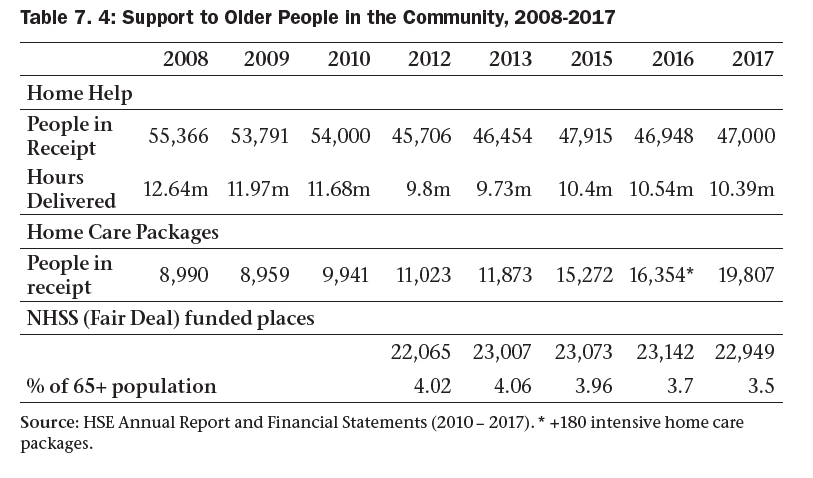Time to create a statutory basis for Home Care

Support for people to remain in their own homes is a key and appropriate policy objective and coincides with the wishes of most older people. A well-developed, co-ordinated and integrated approach to the management of older people’s needs reduces referrals to long-term residential care. However, formal home care funded by the State in Ireland is considered low by comparison with other countries. Government is committed to supporting people to live in their own homes and communities for as long as possible. At present Government seems to be committed in theory only, as the evidence shows a significant decrease in the provision of Home Help Hours since 2008, at a time of population ageing. This decrease is outlined in Table 7.4 below (taken from Social Justice Matters 2019, our annual socio-economic review).

As the table shows, the numbers of people receiving home help and the hours allocated reduced from 2008 and especially from 2010. Notwithstanding increases in recent years, there were still more than 8,000 fewer people in receipt of Home Help support in 2017 than there had been in 2008 (a reduction of 15 per cent) and there were some 2.25 million fewer hours delivered (a reduction of approximately 18 per cent). Following 2008, the number of people in receipt of Home Care Packages (HCPs) grew but the funding for this scheme was largely static for many years and the average value of each package fell. There was a welcome increase in numbers availing of HCPs in 2017.
Over 60 per cent of the older people’s budget goes towards long-term residential care while only approximately 4 per cent of the over 65 population live in residential care settings. The numbers supported by the NHSS (Fair Deal) scheme in 2017 were approximately 23,000 or around 3.5 per cent of those aged 65 and over.
A statutory basis for home care packages has been called for by Social Justice Ireland. Supporting people to live at home requires an integrated approach that ensures access to a range of supports in the home as well as transitional facilities. To achieve this, deficits in infrastructure need to be addressed urgently with an emphasis on replacement and/or refurbishment of facilities. If this is not done, the inappropriate admission of older people to acute care facilities will continue with consequent negative effects on acute services and unnecessary stress on people and their families. A related issue is the shortage of short-stay community beds intended to enable people to return to their own homes after a period of intervention and support (including step-up, step-down, convalescence, assessment and review, respite and rehabilitation services).
Planning and investment is required to ensure our health services and truly meet the needs of an older population and also to address the infrastructural deficits created by underinvestment within the past decade.
Social Justice Ireland believes that funding in excess of €100m is required at a minimum to bring core community services for HCPs, Home Help, and residential care supports through the Fair Deal scheme to more sustainable levels. This funding will assist in stabilising the current system and allow for a progressive development towards an integrated model of service over a period of years based on an appropriate allocation for demographic growth each year.